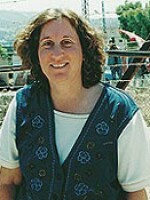
The Israeli government ruled out a large-scale military response to ongoing Palestinian rocket fire from the Gaza Strip into Israel on Wednesday. But Israeli Prime Minister Ehud Olmert ordered the army to draw up a plan for cutting water and electricity to Gaza if the rocket fire continues.
A frequent target of the rockets is the southern Israeli town of Sderot. Hundreds of angry residents went to Jerusalem Wednesday demanding that the government do more to protect them.
About a dozen children from Sderot were among the demonstrators. They stood on a mound of sand opposite the prime minister's office calling on Olmert to resign.
Nirya Davidi, 9, says she's tired of living under the almost daily threat of Kassem rockets.
"I just want to be safe in Sderot. I don't want money or anything else, just to be safe," Davidi says. "I don't want a Kassem rocket to fall on me. I want the prime minister to come to Sderot and see what it's like. Maybe then he'll do something."
Sderot, with its 22,000 residents, is a middle-class town with tree-lined streets just a few miles from Gaza. Residents have only about 20 seconds to take shelter when an alarm warns of an incoming rocket.
Olmert convened his security Cabinet to discuss an Israeli response to the rocket fire. In a statement after the five-hour meeting, the government expressed solidarity with the residents and promised to continue what it called "intensive military operations" against all those involved in rocket launching.
The government said it holds the Islamist movement Hamas, which seized control of Gaza in June, responsible for the rocket fire. But another militant group, Islamic Jihad, has claimed responsibility for the latest barrages saying they were to avenge an Israeli attack in Gaza that left three Palestinian children dead.
Since Israel withdrew from Gaza two years ago, more than 2,000 rockets have been fired from Gaza into southern Israel. The rockets are crude and highly inaccurate, frequently landing in empty fields. But two Israelis have been killed in rocket attacks so far this year.
What sparked Wednesday's protest was a rocket that landed next to a Sderot nursery school earlier this week as parents were dropping off their children. TV footage of panicked parents and children running for shelter aired repeatedly in Israel. A parents' committee closed down Sderot's schools indefinitely.
At the demonstration, Shalom Halevi, who has lived in Sderot for decades, says life has become intolerable.
"Kassem rockets continue to fall on Sderot and the government and the prime minister [continue to say] 'We will do our best. We are doing our best'," Helevi says. "They are doing nothing."
Halevi says the limited Israeli military incursions into Gaza have not been effective.
He says Israel must squeeze the population of Gaza, which will then pressure Hamas to halt the rocket fire. Halevi says Israel should cut off water, electricity and fuel shipments to Gaza every time a rocket is fired.
"Till they will understand that if they want to live quietly ... they must stop," Halevi says.
Human rights groups argue that such steps amount to collective punishment and violate international law. But several Israeli Cabinet ministers favor those steps. Vice Premier Haim Ramon said this week that Israel should put a "price tag" on each rocket attack. Foreign Minister Tzippi Livni said life in Gaza cannot continue normally as long as life in Israel is not normal.
"Gaza Strip depends on Israel's good will in several things," Livni says. "I think it's about time that we will discuss what kind of steps we can take in order to send a message."
Copyright 2022 NPR. To see more, visit https://www.npr.org. 9(MDAzMjM2NDYzMDEyMzc1Njk5NjAxNzY3OQ001))







